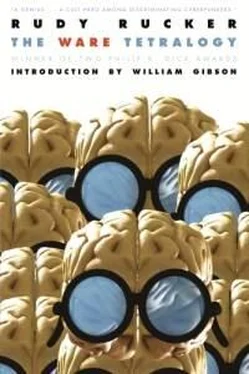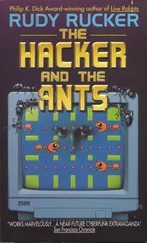Rudy Rucker - The Ware Tetralogy
Здесь есть возможность читать онлайн «Rudy Rucker - The Ware Tetralogy» весь текст электронной книги совершенно бесплатно (целиком полную версию без сокращений). В некоторых случаях можно слушать аудио, скачать через торрент в формате fb2 и присутствует краткое содержание. Год выпуска: 2010, Жанр: Киберпанк, на английском языке. Описание произведения, (предисловие) а так же отзывы посетителей доступны на портале библиотеки ЛибКат.
- Название:The Ware Tetralogy
- Автор:
- Жанр:
- Год:2010
- ISBN:нет данных
- Рейтинг книги:5 / 5. Голосов: 1
-
Избранное:Добавить в избранное
- Отзывы:
-
Ваша оценка:
- 100
- 1
- 2
- 3
- 4
- 5
The Ware Tetralogy: краткое содержание, описание и аннотация
Предлагаем к чтению аннотацию, описание, краткое содержание или предисловие (зависит от того, что написал сам автор книги «The Ware Tetralogy»). Если вы не нашли необходимую информацию о книге — напишите в комментариях, мы постараемся отыскать её.
The Ware Tetralogy — читать онлайн бесплатно полную книгу (весь текст) целиком
Ниже представлен текст книги, разбитый по страницам. Система сохранения места последней прочитанной страницы, позволяет с удобством читать онлайн бесплатно книгу «The Ware Tetralogy», без необходимости каждый раз заново искать на чём Вы остановились. Поставьте закладку, и сможете в любой момент перейти на страницу, на которой закончили чтение.
Интервал:
Закладка:
Cobb let his mind’s eye follow an underground tunnel that led from Einstein to a lab in the opposite side of the Nest. Then he drew back, and looked at the Nest as a whole. Berenice had labeled various “attractions” for him: the pink-tanks, the light-pool, the chipworks, the etchery, the temple of the One, and the best shopping districts. If that’s what Berenice wanted him to see, maybe he’d start with something else. He shoved the map cube into a pouch in the belly of his flickercladding and stared out at the real Nest once more. There were a lot of boppers spiraling in and out of the sunshaft.
They made Cobb think of the fireflies he used to catch back in Louisville when he was a boy. What happy times those had been! He and Cousin Nita running around Aunt Nellie’s yard, each of them with a jelly jar, in the bright moonlit night. Uncle Henry kept his lawn weed-free and mowed short—it felt like a rug to your bare feet, a rug in a lovely dim room furnished with flowering bushes . . .
The memories drifted on and on till Cobb caught himself with a start. Woolgathering like an old man. Time to get busy! But on what? Investigating the Nest, right. Where to start? Almost at random, Cobb fixed on a blank-looking region off to the side of the chipworks, near where the map cube had shown the temple of the One. He visualized his trajectory, rose on his toes, and took off .
He landed, as it turned out, in a small junkyard. The center of the junkyard was filled with a dizzying mound of empty body-boxes—a mound that, in the low lunar gravity, had reached cartoonlike height and instability. It looked as if it should fall any second—but it didn’t, even when Cobb thumped down next to it. Something like a junkyard dog was on Cobb in a flash—glued to his side like a heavy sucker-fish.
The soft , parasitical creature seemed to be made entirely of imipolex. It was yellow with splotches of green. Cobb could feel a kind of burning where its thick end had attached to his hip. He used both hands to lever it off of him, flipped it onto the ground, and gave it a sharp kick. It curled into a ball that rolled past the cowingly great body-box heap, and came to rest against a bin filled with electromagnetic relays.
“Whass happenin?”
Cobb turned to face a bopper that looked like a cross between a praying mantis and tangle of coat hangers. It had scores of thin thin legs, each leg with a specialized tool at its tip. Its photoreceptors and transmission antennae were clustered into a bulblike protrusion that slightly resembled a face.
“I’m just looking around,” said Cobb. “Where do you get all these parts?”
“Pawns, kills, junkers, and repos. You buyin or sellin?”
“I’m new here. I’m Cobb Anderson, the man who built the first moon-robots.”
“Sho. Thass a real nice body, thass a brand new model. Ah’m Fleegle.” Fleegle stepped closer and ran his wiry appendages over Cobb admiringly. “Genuine diplomat body, petaflop and ready to flah. Ah’ll give you ten K an a new teraflop of yo choice.”
“Forget it, Fleegle. What could I buy with your ten thousand chips that would be better than this?”
Fleegle regarded him levelly. The sluglike “junkyard dog” came humping back across the lot and slid up onto Fleegle’s wiry frame. It smoothed itself over his central pod; it was his flickercladding.
“Effen you don know,” said Fleegle, “best not mess with it.” He turned and went back to work; disassembling a blanked-out digger robot. Why was the robot blank? Had its owner moved on to a better body? Or had the owner been forced willy-nilly into nonexistence?
Fleegle and the junkyard gave Cobb the creeps. He picked his way out past the boxes of parts and into the street. Looming in the near distance was the chipworks, a huge structure with bright smelters showing through its window holes. This street was lined with small operations devoted to the salvage and repair of body parts. The boppers were a bit like the kind of crazed superconsumer who no sooner gets a new car than he starts scheming on what to trade it in for. Each bopper had, as Cobb recalled, a basic directive to build itself a new body every ten months.
But some of the boppers on this ugly little factory street looked more than ten months old. Right here in front of Cobb, for instance, was a primitive metal shoebox on treads that looked a bit like the old Ralph Numbers.
“Why don’t you have a new body?” Cobb asked it.
The machine emitted a frightened glyph of Cobb smashing it in and selling its parts. “I . . . I’m sorry, lord,” it stammered. “I’ll run down soon enough. They won’t let me near the light-pool anymore.”
“But why don’t you do something to earn the chips to buy a new body?” pressed Cobb. Two or three other aimless old robots came clanking over to watch the conversation.
“Obsolete,” sighed the box on treads, wagging its corroded head. “You know that. Please don’t kill me, lord. You’re rich, you don’t need my chips.”
“Sure, go on and crack the deselected old clunker open,” urged one of the other boppers, slightly newer in appearance. “I’ll help you, bwana.”
This was a beat-up digger talking, with its drill-bit face worn smooth. He bashed at the first bopper to no avail. A third bopper darted in and tried to tear off one of the second bopper’s shovel arms.
Cobb stepped around the sordid melee, and took a street that led off to the right and into a tunnel. The shrine of the One was in there someplace. The One was a randomization device—actually a cosmic-ray counter— that Cobb had programmed the original boppers to plug into every so often, just to keep them from falling into stasis. Actually, the thorough meme-shuffling produced when boppers conjugated to jointly program a new scion was a better source of program diversity, just as on earth the main source of evolutionary change is the gene-shuffling of sexual reproduction, rather than occasional lucky strike of a favorable gene mutation. Nevertheless, the boppers took their “plugging into the One” seriously, and Cobb recalled from his conversations with Mr. Frostee that the boppers had built up some more or less religious beliefs about their One. Of course, now that he’d been in heaven, he had to admit that there was a sense in which they were right. As Mr. Frostee had said, “Why do you think they’re called cosmic rays?”
Cobb stopped at the mouth of the tunnel leading into the cliff , and peered up. It was an oppressive sight: the two-mile-high wall of stone that beetled out overhead like a tilting gravestone. Heaven and death. Stress. Cobb remembered that he still wanted to get drunk, if such a thing were possible in this clean Berenice-built body. There were certainly no built-in fuzzer programs, he’d already made sure of that. What did today’s boppers do for kicks? It had seemed like Fleegle had been on the point of telling him about something sinful . . .
“Ssst,” came a voice, cueing right in on his thoughts. “You lookin to dreak?” Faint glyph of pleasure.
Hard as he looked, Cobb couldn’t make out the source of the voice.
“Maybe,” he said tentatively. “If you mean feeling good. If it doesn’t cost me an arm and a leg.”
“Two thousand chips . . . or an arm’s OK, too,” said the voice. “Up to the shoulder.” Now Cobb saw something shifting against the cliff; a big, lozenge-shaped patch of flickercladding that matched the gray rock surface in endless detail. If he looked hard he could make out the thing’s borders. It was the size of a ragged bedsheet. “Come on in,” it urged. “Party time. Dreak out, peta. You can afford a new arm, clear.”
“Uh . . . “
“Walk through me. I’ll snip, and you’ll trip. Plenty of room inside. Nobody but petas in there, pinkboy, it’s high-tone.”
Читать дальшеИнтервал:
Закладка:
Похожие книги на «The Ware Tetralogy»
Представляем Вашему вниманию похожие книги на «The Ware Tetralogy» списком для выбора. Мы отобрали схожую по названию и смыслу литературу в надежде предоставить читателям больше вариантов отыскать новые, интересные, ещё непрочитанные произведения.
Обсуждение, отзывы о книге «The Ware Tetralogy» и просто собственные мнения читателей. Оставьте ваши комментарии, напишите, что Вы думаете о произведении, его смысле или главных героях. Укажите что конкретно понравилось, а что нет, и почему Вы так считаете.











